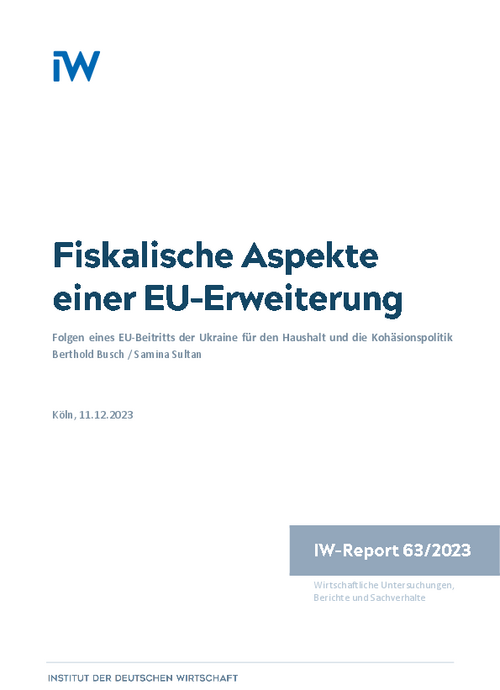Following the European Commission's recommendation to open accession negotiations with Ukraine, the European Council will decide on this at its summit in December. This is a historic step that is of great geostrategic importance, particularly in light of the ongoing Russian war of aggression.

Fiscal aspects of an EU-enlargement: Consequences of Ukraine's accession to the EU for the budget and cohesion policy

Following the European Commission's recommendation to open accession negotiations with Ukraine, the European Council will decide on this at its summit in December. This is a historic step that is of great geostrategic importance, particularly in light of the ongoing Russian war of aggression.
If Ukraine joins the European Union (EU) in the next few years, this will have several consequences. Not least, such an accession will have an impact on the EU budget. As a highly populated, less prosperous and agriculturally dominated country, it is foreseeable that Ukraine would be entitled to extensive financial resources from the EU budget. Despite the great uncertainties that still exist regarding Ukraine's accession, for example regarding the exact formal structure or the time frame, a quantitative estimate of the costs is important for the further debate. In an estimate, this report puts the financial consequences of Ukraine's full membership on the current Multiannual Financial Framework (MFF) 2021 to 2027 at between around 130 and 190 billion euros, depending on the assumptions made about Ukraine's arable land area and population. Of this, between around 70 and 90 billion euros would be allocated to agricultural subsidies. Cohesion policy would account for between 50 and 90 billion euros.
In view of this volume, the EU must be prepared to reform itself. Only then can the political decision to bind Ukraine in particular more closely to the EU with the prospect of accession be credible. This applies not only to the institutional level, but it also applies to the fiscal level. The necessary financial resources could be made available through a reallocation in the EU budget, for example. One possible starting point for this would be the cohesion policy. As one of the primary objectives of the European cohesion policy is to support less developed regions, a reallocation in this field would be logical in case Ukraine joins the EU. If European cohesion policy were to switch to a concentration model, in which cohesion spending is limited to the poorer member states, it is estimated that financial resources of around 140 billion euros would be available over the seven-year period of the MFF. A reallocation of cohesion policy would therefore be able to make a significant contribution to covering the costs of Ukraine's EU accession. Despite all justified criticism of a concentration of European cohesion funds, this potential must be taken into account, for example when drawing up the next MFF from 2028 to 2034, during which time an enlargement of the EU could take place.

Fiscal aspects of an EU-enlargement: Consequences of Ukraine's accession to the EU for the budget and cohesion policy

More on the topic
![[Translate to English:] Das Gebäude des Weißen Hauses in Washington, D.C. in den Vereinigten Staaten von Amerika. [Translate to English:] Das Gebäude des Weißen Hauses in Washington, D.C. in den Vereinigten Staaten von Amerika.](/fileadmin/_processed_/c/1/csm_GettyImages-2161499385_White_House_Editorial_884306add8.jpg)
Trump or Harris or ...? What Europe must prepare for
A few months before the presidential election in the USA, Donald Trump has a good chance of being re-elected. On the Democratic side, the incumbent president has withdrawn his candidacy after a long period of hesitation, while Vice President Kamala Harris is ...
IW
Compendium 5.5: CO2 Regulation of Road Transport in Europe
With the Compendium CO2 Regulation in Europe, the IW has been providing the interested public with a comprehensive collection of data on the development of CO2 emissions from passenger car traffic in the European Union, as well as on the applicable regulatory ...
IW